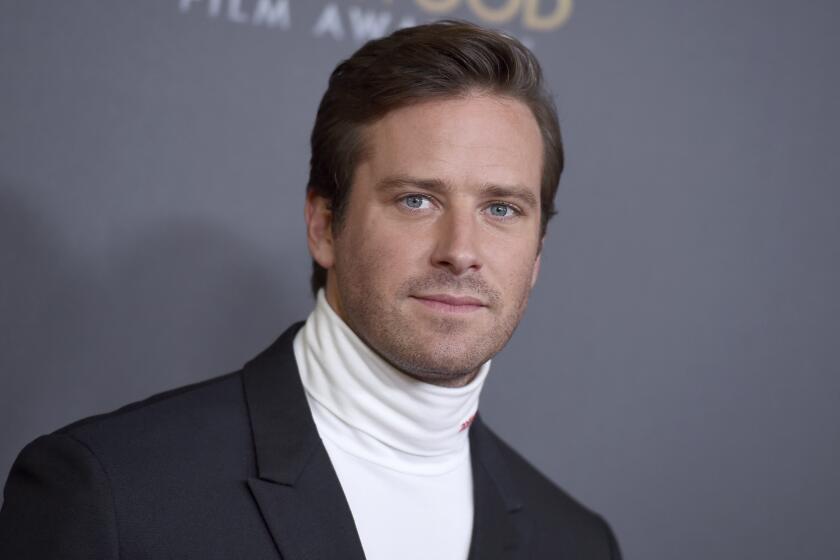Al Gore’s ‘Inconvenient Sequel’ arrives at Sundance at a skeptical moment for climate change movies

Last summer, organizers of the Sundance Film Festival found themselves stumped. Where had all the movies about the destruction of the planet gone?
“After a flurry of documentaries like ‘The Cove’ and ‘Blackfish,’ we’d seen a decline in films about the climate over the last few years,” recalled John Cooper, the festival’s director. “Maybe nobody cared anymore. Climate change seemed to have slipped out of the public awareness a little bit, and it wasn’t helped at all during the election process, because nobody was talking about it much then, either.”
FULL COVERAGE: 2017 Sundance Film Festival »
Even this week’s news that 2016 was the hottest year since 1880 — the third record-breaking year in a row — didn’t get much traction. In this moment when the incoming president of the United States has questioned whether climate change is real — and took down the White House website climate change policy page moments after being sworn into office — documentaries about the environment are a hard sell at movie theaters. They often urge filmgoers to make real-life changes: Stop eating so much steak, invest in solar panels, drive electric cars.
Instead, ticket buyers have displayed a preference for getting lost in fictional films about the apocalypse. Five of the films that took in more than $500 million worldwide last year — “Captain America: Civil War,” “Doctor Strange,” “Suicide Squad,” “Batman v Superman: Dawn of Justice” and “X-Men: Apocalypse” — contained Earth-threatening scenarios. And in the $987.2 million-earning “Rogue One: A Star Wars Story,” an entire planet is destroyed. Even Zootopia, the No. 3 film worldwide last year, had a nature-out-of-control story line.
Contrast that with the $9.6 million made worldwide by last year’s top-grossing documentary, the IMAX film “A Beautiful Planet,” which got a boost from multiple daily screenings at science centers across the country. That’s far below the $49.8 million earned worldwide for Al Gore’s “An Inconvenient Truth” in 2006 and the $127.4 million worldwide gross for “March of the Penguins” in 2005.
Despite the seeming drop in interest, Sundance organizers — including founder Robert Redford, himself an outspoken environmentalist — are convinced there’s an audience for these documentaries and decided to devote an entire program to “environmental change and conservation” at this year’s festival.
Most prominent in the festival’s New Climate series is Thursday evening’s premiere of “An Inconvenient Sequel: Truth to Power,” the follow-up to the original Gore documentary that debuted at Sundance 11 years ago. The category includes 13 other documentaries, short films and virtual reality experiences. Among them are feature films about the eradication of coral reefs, trophy hunting and the California drought.
As luck would have it, Cooper said, just after last summer’s meeting in Los Angeles, he and his team found that the year’s submissions had a “hefty environmental focus, just by fate.”
“Maybe there was just a lot of stuff in the pipeline, because these movies do take a while to make. Or maybe we were just overreactive at that point,” he said with a laugh.
“For many, many years I would push on Cooper and say, ‘Gosh, can’t we do more about the environment?’” Redford recalled. “And he says, ‘No, no, we don’t advocate and there aren’t that many films and so we can’t create a category.’ And I respected that. But what’s happened is more and more films dealing with the environment have come to us. They’ve created their own category.”
Since its inception, Sundance has been responsible for launching some of the most impactful films about the environment. “An Inconvenient Truth,” which focused on the ways humans were contributing to climate change, went on to win two Academy Awards after its 2006 Sundance premiere. Four years later, the festival premiered “Gasland,” Josh Fox’s documentary exploring the repercussions of fracking for natural gas, which included a much-debated scene of water from a faucet catching fire.
Then there were the animal rights films “The Cove” and “Blackfish,” which questioned the way humans treat dolphins and whales, and in the case of “Blackfish,” ultimately led to the end of orca performances at SeaWorld.
“Blackfish,” which debuted at Sundance in 2013, is a stark example of how a film about the treatment of animals could galvanize viewers in a way that films about the fate of the human race have not. The documentary “Trophy,” which will premiere in Park City this week, seems primed to become the next “Blackfish.” In the wake of outrage over the 2015 killing of Cecil the lion, the movie puts a spotlight on hunters who travel to Africa to shoot big game for sport.
“When it comes to animals, we have a different level of emotion,” said Shaul Schwarz, who directed “Trophy” with his partner Christina Clusiau. “You see an elephant get shot and think, ‘He was just there having breakfast.’ They’re so defenseless that it’s very angering.”
“We have this idea,” added Clusiau, “of African big game from ‘The Lion King’ — this cute, cuddly creature that we all grew up with on the Disney Channel. I think that’s part of why get so enraged.”
In the case of animal welfare documentaries, audiences can direct their anger at a clear target. In “Blackfish,” that was SeaWorld. You don’t like seeing killer whales performing tricks in small pools? Stop buying tickets to the marine park. After news broke that Cecil had been killed by a Minnesotan dentist who paid $50,000 to shoot the lion, protesters shamed the hunter online and boycotters turned up at his dental practice. (For the record, the “Trophy” filmmakers are hopeful the subjects in their film will not receive this kind of treatment.)
“You’re tapping into a specific target there, and for films about the climate, the challenge is that the target is the fossil fuel industry,” said Jeff Orlowski, whose 2012 film “Chasing Ice” documented the melting of glaciers. For his latest movie, “Chasing Coral,” which is part of the New Climate series, Orlowski set up underwater cameras at the Great Barrier Reef to capture how coral ecosystems are dying off as ocean temperatures rise.
“I’m not trying to sound like a conspiracy theorist, but there’s a lot of confusion out there about this issue,” continued Orlowski. “People are genuinely confused about how bad things are and whether or not we can do anything about it. It’s that confusion and that doubt that makes people feel like, ‘Well, what can I do? We can’t possibly solve this.’ And the reality is we can solve this.”
Redford, who talked about falling in love with the outdoors on a trip to Yosemite National Park at age 11, said he often encounters those who feel paralyzed by the possibility of addressing climate change. “And I think there’s still doubt out there,” he said. “I think that’s decreasing, but it’s still out there.”
President-elect Donald Trump may have called climate change a “hoax” invented by the Chinese, but since the election he has acknowledged “some connectivity” between human activity and the warming of the planet. He also recently selected Scott Pruitt to lead the Environmental Protection Agency, the Oklahoma attorney general who wrote in the National Review last year that “scientists continue to disagree about the degree and extent of global warming and its connection to the actions of mankind.”
Still, many filmmakers remain optimistic about audiences’ willingness to contemplate these thorny issues. John Hoffman, executive vice president of documentaries and specials at the Discovery Channel, recently launched an initiative at the network to focus on pressing environmental issues.
Viewers have been receptive to the programming, he said.
“I don’t see it as a self-selecting audience, because these are people who are also watching ‘Motor Monday’ and ‘Gold Rush,’” said Hoffman, referring to Discovery’s decidedly non-environmental offerings. (A movie he co-directed, “Rancher, Farmer, Fisherman,” will play at Sundance this week and premiere on Discovery in August.) “We hadn’t been offering them a lot of topical documentaries, so we didn’t know whether they’d be interested. But we’ve received great affirmation that they are.”
Television watchers, it turns out, may be the most receptive viewers for environmentally minded documentaries. “Blackfish,” for instance, may have made a respectable $2.1 million at the box office, but it received repeated viewings and promotion on CNN.
And Leonardo DiCaprio’s most recent documentary, “Before the Flood,” directed by Fisher Stevens and featuring dire warnings about the fate of the Earth if climate change remains unchecked, recently broke viewing records for National Geographic. Forgoing a regular theatrical release, “Before the Flood” had a limited theatrical preview in Los Angeles, New York and London before airing on NatGeo channels and was distributed for free on digital and streaming platforms worldwide. This led to it reaching more than 60 million people, making it NatGeo’s most viewed film.
Sundance and Discovery have started a new fellowship to encourage filmmakers to continue making films about the environment. Last year Orlowski received a $10,000 grant through the program to help him with “Chasing Coral.”
“I don’t want to be making films about the environment,” the director said. “We’re documenting the destruction of natural resources and our home. I’d much rather this not be a real issue. I’d much rather us just solve it and acknowledge it so we can move onto other things.
“But in an unfortunate way,” he continued, “it’s become a little more important. Climate change has become a politicized issue, unfortunately. How do we get it past that?”
No one knows that better than Gore, who in “An Inconvenient Sequel” says of his efforts to get the public interested in climate change, “If there were times I said this didn’t feel like a personal failure, I’d be lying,”
But at the film’s Thursday night Sundance premiere, Gore had a more upbeat message for the crowd: “We are going to prevail. And if anybody has doubts about our will to act, just remember: The will to act is itself a renewable resource.”
Follow me on Twitter @AmyKinLA
ALSO
Al Gore on Donald Trump: ‘No one person can stop’ climate change movement
‘Blackfish’ filmmaker ‘never imagined’ her documentary on SeaWorld would have such a major effect
‘Blackfish’s’ director, now its ‘steward,’ finds it hard to move on
The lawyer fighting for animal rights in ‘Unlocking the Cage’ asks: ‘What kind of being are you?’
UPDATES:
Jan. 20, 3:24 p.m.: This article was updated with additional details from the premiere screening of “An Inconvenient Sequel: Truth to Power,” including quotes from Al Gore. The article was originally published Jan. 19 at 3:40 p.m.
More to Read
Only good movies
Get the Indie Focus newsletter, Mark Olsen's weekly guide to the world of cinema.
You may occasionally receive promotional content from the Los Angeles Times.











